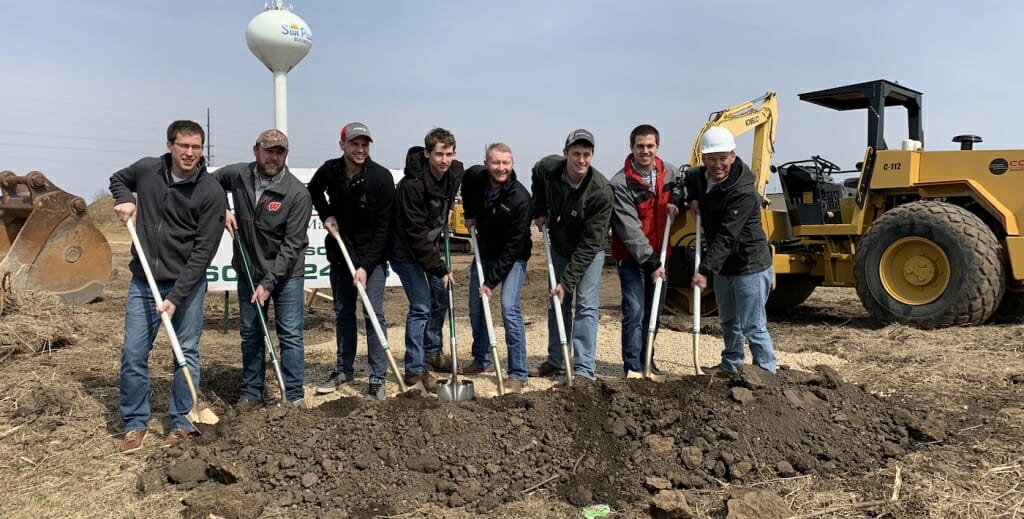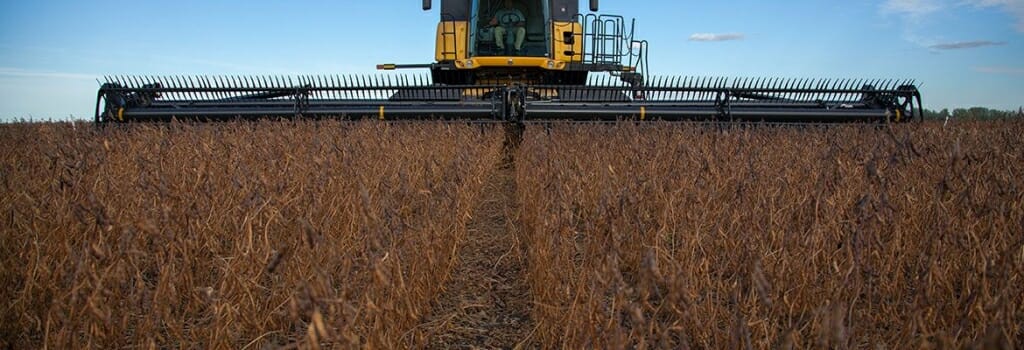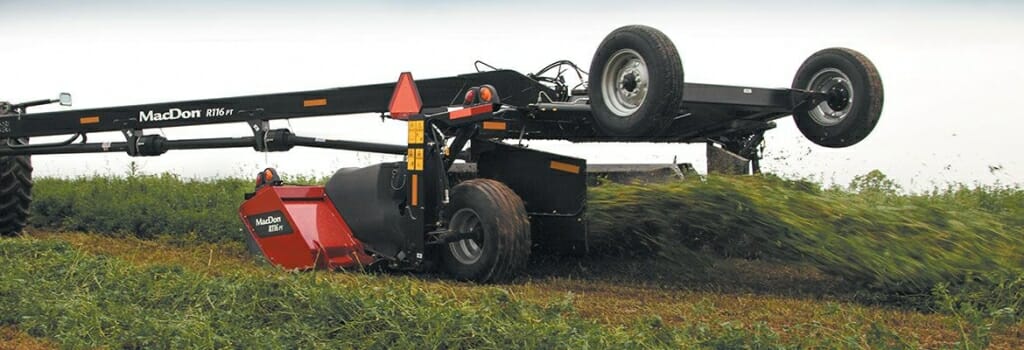Canada firm expands in Wisconsin to hire more farm-raised engineers

The Madison employees at MacDon, an agricultural equipment manufacturer, helped break ground at a new facility in Sun Prairie Business Park. (From left; * identifies UW–Madison alumnus) *Scott Dietsche, *Chase Walters, *Nicholas Friberg, Austin Bossaer, *Dan Flick, Karl Hundt, *Nolan Lacy, *Neil Barnett. Brian Straub and Cyrus Nigon, not shown, also have degrees from UW–Madison. Photo courtesy of MacDon
MacDon Enterprises, Inc., a Canadian maker of harvesting equipment, broke ground on a research and development facility in Sun Prairie March 27. The building will enable the company to double its Madison-area workforce to about 20.
MacDon set up shop in Madison in 2015 for a simple reason, says Neil Barnett, manager of Madison-area operations. “We moved here to increase access to engineering talent. We wanted engineers who had farm experience. We have found that this generally is a good recipe for product development.”
Eight of the 10 engineers now designing harvesting equipment at MacDon’s east side Madison, offices graduated from UW–Madison. Many degrees come from the department of biological systems engineering in the College of Agricultural and Life Sciences (CALS). Some, including Barnett, graduated from the College of Engineering.

MacDon’s flex “draper” harvesting header combines a flexible frame with rubber draper belts to move the crop into the combine. “This innovative header helps the reel to follow the knife and ensures smooth flow of the crop,” says Neil Barnett, head of MacDon’s Madison research and design office. The result is less grain loss and smoother combine operation. Photo courtesy of MacDon
The expansion into Wisconsin was predicated on the state’s strong agricultural tradition. MacDon, an affiliate of MacDon Industries Ltd., is based in Winnipeg, Manitoba, an epicenter of vast grain farms. “Wisconsin is a fairly dense farm state,” Barnett says. “We come from Western Canada, where it’s ag-intense, but not farm dense, because 5,000 acres is now a reasonable-size farm. In Wisconsin, there are a lot more people who were exposed to agriculture at a young age, and are interested, passionate. That’s who we are after.”
It didn’t hurt that UW–Madison has prowess in several engineering fields need for farm-equipment design.
Experience is a great mentor, suggests Kevin Shinners, a professor of agricultural engineering in biological system at CALS, who advised many of MacDon’s Madison employees. “Whenever you work with equipment, and struggle all day long to get a job done in a timely, efficient fashion, you do a lot of thinking, especially if you are the kind of person who is interested in technology, engineering. You wonder, how can I do it do better?

MacDon’s pull-type mower has a transport mechanism so the machine can be towed endwise down the road. Photo courtesy MacDon
“The thing that young engineers from an agricultural background bring to the table is a passion for the subject, the product,” Shinners adds. “They have used these machines extensively, and the things that you are exposed to when young set your passion for life. They bring that to the job, and that’s what MacDon is trying to capture by hiring them.”
The site in the Sun Prairie Business Park will provide about 15,000 square feet of design and shop space, enough for about 20 employees. The building is expected to open this fall.
The expansion is a vote of confidence in MacDon’s existing Madison employees, and a sign that hiring engineers with farm backgrounds makes sense, Barnett says. “We are satisfied with where we are at, have grown slowly, steadily, and we have gotten the people we want.”
As farm-equipment technology advances, so have the company’s engineering needs, Barnett says. “The digital technology revolution affects everything we do, from providing input to adjust equipment settings to eventually, perhaps, completely removing the need for an operator within the cab, or even in the same field.”
These changes affect the workforce needs, Barnett adds. “So far, we have focused on the mechanical side, but a lot of the UW engineers come out of school with ‘mecha-tronic’ aptitudes, combining mechanical, hydraulic, electronics. And increasingly, this is exactly what we need to design tomorrow’s harvesting equipment.”
The idea that “kids off the farm” have limited exposure to technology is as obsolete as a two-cylinder John Deere tractor. “You would be surprised at how technically savvy they are,” Shinners says. “They have worked with computers from a young age. I have been very impressed at the young folks working at MacDon, for their technical skills, abilities.”
In Sun Prairie, Barnett says, “There is a strong desire to diversify and grow, that’s a mandate from our parent company, Linamar. But we’re going to stay within agriculture. We are here to advance ag equipment.”
